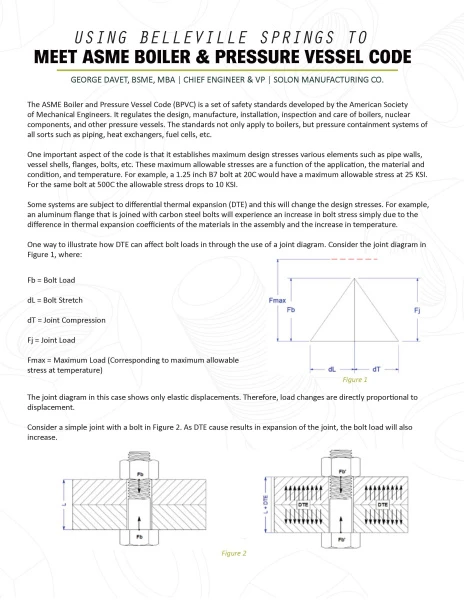Using Belleville Springs to Meet ASME Boiler & Vessel Code

The ASME Boiler and Vessel Code (BPVC) is a set of safety standards developed by the American Society of Mechanical Engineers. It regulates the design, manufacture, installation, inspection and care of boilers, nuclear components, and other pressure vessels. The standards not only apply to boilers, but pressure containment systems of all sorts such as piping, heat exchangers, fuel cells, etc.
One important aspect of the code is that it establishes maximum design stresses various elements such as pipe walls, vessel shells, flanges, bolts, etc. These maximum allowable stresses are a function of the application, the material and condition, and temperature. For example, a 1.25 inch B7 bolt at 20C would have a maximum allowable stress at 25 KSI. For the same bolt at 500C the allowable stress drops to 10 KSI.
Some systems are subject to differential thermal expansion (DTE) and this will change the design stresses. DTE is experienced when connecting materials expand or contract at different rates during a change in temperature and impact the performance of the joint integrity.
Meet Code Requirements | Reduce the Effects of Differential Thermal Expansion (DTE) by Stacking Belleville Washers
The white paper, Using Belleville Springs to Meet ASME Boiler and Vessel Code, illustrates how DTE can affect bolt loads and details ways to ensure bolt load is always less than maximum load in a bolted joint application. Download the white paper for guidelines for reducing DTE, including how to stack Belleville springs in an arrangement within the fastening system that increases elasticity and bolt load, while counteracting the effects of differential thermal expansion.
Learn more about the use of Solon Belleville Springs & Washers
Calculator Tools: Application-specific Product Selection Tools
Industries Served: Hydrogen Fuel Cells
Resource Library: Videos, White Papers, Case Studies and more
Contact Us



